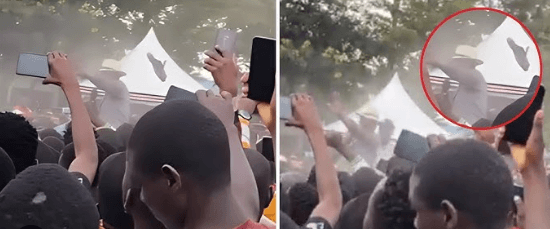Kenya witnessed a shocking security lapse on Sunday in Kehancha, Migori County, that would typically trigger a national outcry—but instead became the butt of jokes.
President William Ruto, while addressing locals on the 294-unit affordable housing project, was forced to momentarily halt his speech and instinctively swat away a flying shoe hurled from the crowd.
The projectile, a croc, came dangerously close to his face—raising alarms over just how porous the security around the head of state has become.
In any other country, this incident would have prompted serious investigations, urgent reforms, and public concern over the president’s safety.
But in Kenya, it was meme-fodder within minutes.
The online community reacted not with outrage, but with puns, satire, and shoe jokes that quickly went viral. It was as if Kenyans had pre-scripted the mockery before the shoe even landed.
I mean.. We’re barely recovering from the shock of a sitting MP’s assassination and the rattling AK-47 gunfire that echoed through recent violence—after a Cabinet Secretary left a security meeting.
This bizarre episode reflects a growing culture of indifference and satire in the face of national crises. The same apathy greeted the recent assassination of sitting MP Charles Ong’ondo Were—a chilling political hit that failed to provoke the public emotion it deserved.
This however, solely blamed on the honourable house decision to downplay the BBC Documentary for stirring up anger and shunning accountability on the Security forces who were caught on video shooting up protesters.
The shoe incident isn’t just a humorous blunder—it’s a wake-up call. That an object could be hurled so accurately at the President without intervention raises disturbing questions about the effectiveness of presidential security detail.
What should really happen when you throw a shoe at the President?
When an object is thrown at a sitting head of state in public, no matter how harmless it may appear, standard security protocols should be triggered immediately.
First and foremost, the presidential protection unit should have anticipated and neutralized any such threat before it even materialized. The flying shoe—reportedly a Croc—came within inches of the president’s face, and it was only through his quick reflexes that it was swatted away mid-speech.
The attacker should have been subdued on the spot, isolated from the crowd, and handed over to the police for further questioning.
Whether the act was politically motivated, intended as a protest, or a reckless outburst, determining the intent is vital in evaluating any larger security threat. Immediate crowd control measures should also have been implemented to prevent further escalation.
Beyond the physical response, a comprehensive security debrief ought to follow such an incident.
The Kenya Presidential Escort Unit and other relevant bodies should assess the lapse, review surveillance footage, and apply necessary disciplinary action where applicable.
It also calls for a reassessment of security protocols during public events, especially in politically tense regions.
Lastly, such an incident warrants a strong legal response. Assaulting or attempting to harm the president, even symbolically, is a serious offense. The law must be applied to deter future acts of aggression or ridicule that compromise the dignity and safety of the presidency.
This incident, though met with humor online, should be treated with the gravity it deserves. The safety of the head of state is not just a matter of protocol—it’s a cornerstone of national stability.
But we joke away…
Yet perhaps more troubling is the national psyche—one that laughs off danger and shrugs at tragedy. When the presidency becomes the target of airborne protest and the assassination of legislators barely causes a ripple, we must ask: What has happened to the weight of our institutions?
Security must be tightened—but more urgently, so must our civic seriousness.



















